
As general terms, Indian Territory, the Indian Territories, or Indian country describe an evolving land area set aside by the United States Government for the relocation of Native Americans who held aboriginal title to their land. In general, the tribes ceded land they occupied in exchange for land grants in 1803. The concept of an Indian Territory was an outcome of the 18th- and 19th-century policy of Indian removal. After the Civil War (1861–1865), the policy of the government was one of assimilation.
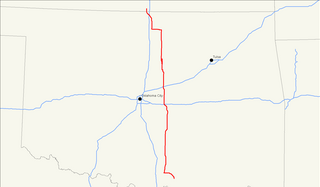
U.S. Route 177 (US 177) is a spur of U.S. Route 77. It currently runs for 233 miles (375 km) from South Haven, Kansas at US 81 to Madill, Oklahoma at US 70. It passes through the states of Kansas and Oklahoma.
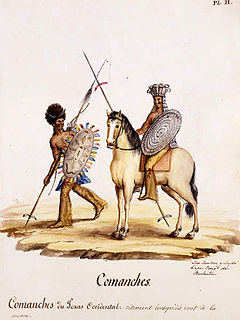
The Antelope Hills expedition was a campaign from January–May 1858 by the Texas Rangers and members of other allied Native American tribes against Comanche and Kiowa villages in the Comancheria. It began in western Texas and ended in a series of fights with the Comanche tribe on May 12, 1858, at a place called Antelope Hills by Little Robe Creek, a tributary of the Canadian River in what is now Oklahoma. The hills are also called the "South Canadians," as they surround the Canadian River. The fighting on May 12, 1858, is often called the Battle of Little Robe Creek.

The Salt Fork of the Arkansas River is a 239-mile-long (385 km) tributary of the Arkansas River in southern Kansas and northern Oklahoma in the United States. Via the Arkansas River, it is part of the watershed of the Mississippi River.
A. D Buck Museum of Science and History is a museum in Tonkawa, Oklahoma located on the campus of Northern Oklahoma College (NOC).

Northern Oklahoma College (NOC) is a public community college in Tonkawa, Oklahoma, with additional campuses located in Enid, Oklahoma and Stillwater, Oklahoma. Student enrollment is approximately 2,700. NOC bought the former Phillips University in Enid, Oklahoma in 1999, and has turned it into the NOC Enid campus.
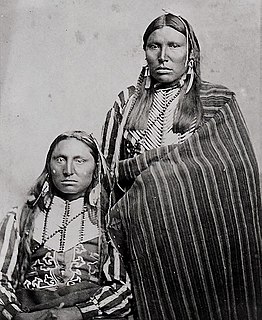
The Battle of Little Robe Creek, also called the Battle of Antelope Hills, took place on May 12, 1858. It actually was a series of three distinct encounters that took place on a single day, between the Comanches on the one side, and Texas Rangers, militia, and allied Tonkawas attacking them. It was undertaken against the laws of the United States at the time, which strictly forbade such an incursion into the Indian Territories of Oklahoma, and marked a significant escalation of the Indian Wars. It also marked the first time American or Texas Ranger forces had penetrated the Comancheria as far as the Wichita Mountains, and Canadian River, and it marked a decisive defeat for the Comanches.
Plácido was major Native American Chief of the Tonkawa Indians in Texas during the Spanish and Mexican rule, the Republic of Texas era, and with Texas as part of the United States.
Iron Jacket was a Native American War Chief and Chief of the Comanche Indians.
Blackwell–Tonkawa Municipal Airport is a public use airport located in Kay County, Oklahoma, United States. The airport is five nautical miles (9 km) southwest of the central business district of Blackwell, Oklahoma and is owned by the cities of Blackwell and Tonkawa.
The Enid and Tonkawa Railway Company' was incorporated on March 20, 1899, under the laws of the territory of Oklahoma. The company constructed a railroad line from North Enid, Oklahoma, to Billings, Oklahoma. The Chicago, Rock Island and Pacific Railroad purchased the company on December 22, 1899. Rock Island completed the line from North Enid to Tonkawa, Oklahoma.
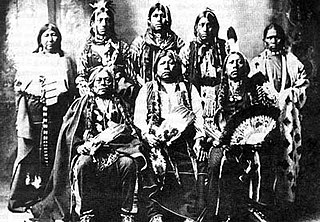
The Tonkawa massacre occurred after an attack at the Confederate held Wichita Agency, located at Fort Sill near Anadarko in Oklahoma, when a force of pro-Union tribes attacked the agency, home to 300 members of the Tonkawa, a tribe sympathetic to the Confederacy. During the attack on the Confederate held agency, the Confederate Indian agent Matthew Leeper and several other whites were killed. In response to this attack the Tonkawa fled southward toward Confederate held Fort Arbuckle, before they could reach the safety of the fort they were caught on October 24. In the resulting massacre, the estimates of Tonkawa dead are 137 men, women and children among them Chief Ha-shu-ka-na, the Tonkawa were roasted alive and eaten by the ruthless Comanche. There are varying accounts of the tribes involved in the massacre with the Osage, Shawnee, Caddo, Comanche, Kiowa, Wichita and Seminole being named in some accounts.
The Yojuane were a people who lived in Texas in the 16th, 17th and 18th centuries. They were closely associated with the Jumano and may have also been related to the Tonkawa. They have no connection to the Yowani in Texas, a Choctaw band.
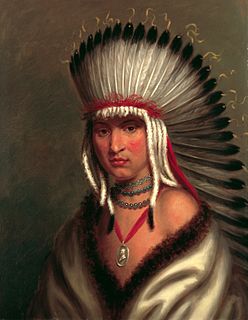
The Skidi or Skiri, also known as the Wolf Pawnee or the French Loup Pawnee, are a band of Pawnee people. According to tradition in earlier times, the Skidi were associated with the Arikara before the Arikara moved northward. The Skidi language was less related to the other Pawnee languages than the other three tribes' languages were related to each other. In historic times, the Skidi first lived on the Loup River in Nebraska.

The First Presbyterian Church of Tonkawa is a historic church at 109 S. 4th Street in Tonkawa, Oklahoma. It was built in 1905. It was added to the National Register of Historic Places in 1994.
Bo Bowling is a former American football player. He attended Tonkawa High School in Tonkawa, Oklahoma. He first enrolled at Northeastern Oklahoma A&M College before transferring to Oklahoma State University. Bowling was a member of the Montreal Alouettes of the Canadian Football League (CFL).











